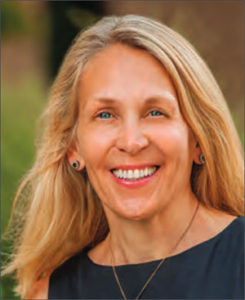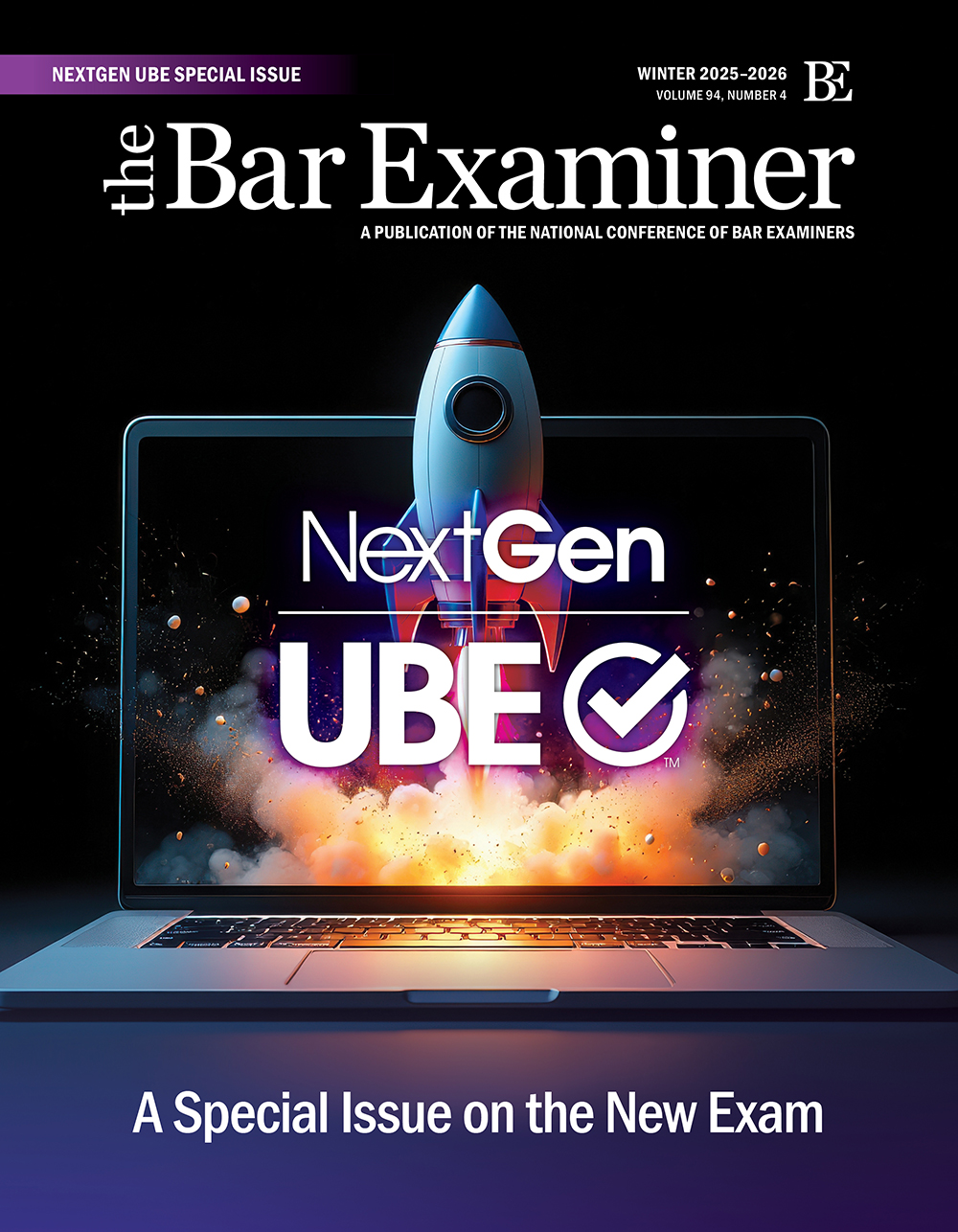This article originally appeared in The Bar Examiner print edition, Spring 2024 (Vol. 93, No. 1), pp. 3–4.By Judith A. Gundersen
 Recapping the February Bar Exam, Considering Access to Justice, and Remembering Diane Bosse
Recapping the February Bar Exam, Considering Access to Justice, and Remembering Diane Bosse
Jurisdictions have now finished releasing their February bar exam results—congratulations to all who passed. The national mean for the Multistate Bar Examination (MBE) was up about 0.6 points compared to February 2023. The MBE mean was not up in all jurisdictions, but for those jurisdictions with a higher mean, it is likely they saw pass rates improve. As noted in a recent Bar Examiner article, the increase in examinees passing depends not only on the jurisdiction’s passing standard but also on the distribution of scores around the passing standard.1
An interesting trend for the past two February administrations is that the percentage of repeat test takers in the pool of examinees is up to about 72%, compared to historical averages of about 68%; as a general rule, repeat test takers achieve lower scores than first-time takers. (See first-time and repeat exam taker statistics for the February 2023 administration). Several jurisdictions recently lowered their passing standards (see UBE page), so we would expect their pass rates to be higher, assuming February 2024 examinee performance remains about the same as that of prior cohorts.
One of these jurisdictions, Washington, also created experiential paths (apprenticeship- and curriculum-based) for licensure, in an effort aimed, in part, at addressing what the Court described as “the severe shortage of licensed attorneys in broad swaths of the state.”2
Addressing the access-to-justice gap is a critical priority among jurisdictions’ highest courts. At NCBE’s Annual Bar Admissions Conference, held in Chicago in early May, we had sessions on addressing both legal service and law school deserts, and programming on alternative paths to admission. NCBE staff and Board members also recently met with a group of justices mainly to talk about the NextGen bar exam, but access to justice was also on the agenda.
The number of underserved litigants in the civil justice system is a problem in virtually every jurisdiction. According to a 2022 report3 released by Legal Services Corporation (the largest funder of civil legal aid for low-income Americans in the nation), low-income Americans did not receive any or enough legal help for 92% of the problems that substantially impacted them in the past year. Fifty-three percent reported that they do not know if they would be able to find a lawyer that they could afford if they needed help with a serious civil legal problem. And only 28% of low-income Americans believe that people like them are treated fairly in the US civil legal system. According to the report, the most common legal problems individuals in this group need help with are consumer issues, health care, housing, and income maintenance.
All of us in the legal profession, legal education, and admissions should be concerned over these statistics, which indicate not only a lack of access to the justice system for low-income people but also (not surprisingly) a lack of confidence in the system itself. It will take law schools, the bar admissions community, courts, legal service providers, and other entities in the legal education/admissions space collaborating to solve this problem.
Facing these challenges, I can’t help but think of our dear friend and colleague, Diane Bosse, who was a consistent innovator and forward-thinking problem solver. Diane passed away suddenly on March 17. Diane led NCBE as a member of the Board of Trustees (1999–2008), including a term as Board chair (2006–2007), and through service on several policy committees, the NextGen Testing Task Force (TTF), and most recently, the NextGen Implementation Steering Committee (ISC). Diane had over four decades of service to the bar admissions and legal education communities (see here for more on her service). All of us at NCBE, in New York, and beyond are still reeling from her sudden and incredibly sad passing.
I met Diane shortly after I started working at NCBE in 2000. I had the honor and privilege of working with her over the next two decades in a variety of contexts, including in Uniform Bar Exam (UBE) conceptualization and implementation. She was an early advocate of the UBE. She saw the enormous benefit of score portability to graduates, consumers, and employers. She also knew the importance of maintaining jurisdiction-specific rules and control over issues like setting eligibility requirements, testing for local law, and setting score transfer policies. That these policies remained under jurisdiction control was critically important for jurisdictions. And of course, she led New York to adopt the UBE in 2016, which surely influenced other jurisdictions. Her ideas, efforts, and leadership helped propel the UBE to where we are in 2024: almost 300,000 newly licensed lawyers have earned UBE scores, and close to 60,000 examinees have taken advantage of score portability.
She also championed adding Civil Procedure to the MBE and conducting a practice analysis in 2011, the latter of which provided important content validation for our exam coverage. That’s enough for one lifetime of bar admissions work. But for those of you who knew Diane, you’d know she was just getting started.
She was asked to serve on NCBE’s TTF beginning in 2018 and then continued to serve on the ISC until her passing. Like everything else she did, Diane gave the TTF, ISC, and the NextGen bar exam her all (which, as noted above, is substantial!). Among other things, as part of the ISC, she was responsible for reviewing and finalizing the content scope outlines for the NextGen bar exam, a process that took the ISC and staff months of intense and protracted meetings, in depth discussion, and additional research. Diane was an integral member of the ISC and a key contributor to defining exam content. Diane knew so much about the law without being a know-it-all! Always kind and generous of spirit. And notwithstanding the intensity and painstaking detail of those ISC meetings, she managed to keep them fun with her quick wit and engaging sense of humor.
In spring 2020, the jurisdictions faced intense pressure over administration of the July 2020 bar exam as COVID-19 emerged as a public health threat. As chair of the New York Board of Law Examiners, Diane needed to get her jurisdiction’s examinees licensed—no small feat with typically 10,000 or so applicants. Rereading communications between us during that challenging time brings back a lot of memories—both good and bad. But I am mostly reminded of and really touched by her unmistakable voice and presence in these emails—brilliant, funny, candid, creative, and unfailingly professional.
Diane retired from the New York Board in September 2020 to spend more time with her dear husband and former law partner, Coleman Volgenau, as they split their time between Florida (where I’m told Diane developed a mean golf game) and Buffalo. My most recent communication with Diane was just four days before she passed away. I am grateful for that opportunity.
Others have shared their own memories of Diane in this issue. She was a mentor to me and others on the NCBE Board and staff. There is no one to replace Diane; we all cherish her memory and are forever grateful for her friendship and her lasting contributions to bar admissions and legal education.
Until the next issue,

Judith A. Gundersen
Notes
- Drew Weiner, MS, “The Testing Column: When the Mean Misleads: Understanding Bar Exam Score Distributions,” 92(1) The Bar Examiner 55–60 (Spring 2023). (Go back)
- Washington Courts: Press Release Detail, “Supreme Court Approves Alternative Pathways to Lawyer Licensure in Washington State” (March 15, 2024), available at https://www.courts.wa.gov/newsinfo/?fa=newsinfo.pressdetail&newsid=50389. (Go back)
- Legal Services Corporation, “The Justice Gap: Executive Summary,” https://justicegap.lsc.gov/resource/executive-summary/. (Go back)
Contact us to request a pdf file of the original article as it appeared in the print edition.







